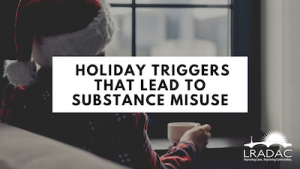Be mindful of holiday triggers that lead to substance misuse
December 3, 2020After a year marked by the first global pandemic, social isolation, and rising unemployment—not to mention political and social turmoil—an overwhelming majority of Americans are looking forward to the holidays and a fresh start in 2021. But for those people challenged by substance misuse, the next month of seasonal celebrations is also one of the hardest times of the year for those in or working toward recovery.
“With all of the pandemic related and societal stressors we all faced in 2020—along with people not being able to fully participate in their recovery programs—we’ve seen a significant rise in substance misuse, overdoses, and mental health issues over the course of this last year,” said Jeremy Martin, VP of Treatment and Intervention Services for LRADAC. “Unfortunately, the holiday season typically has its own set of stressors that can trigger substance misuse or a recurrence of use, so we want to remind people struggling with substance misuse, those in recovery, and their families of some things to be mindful of in the next few weeks.”
Family gatherings: Family gatherings are a source of joy for many, but they can also be a time of great stress. From being around toxic relatives to reliving memories of unpleasant events from the past, be aware of the stress these get-togethers can cause and set your own personal boundaries on how to cope. Either politely decline to attend, limit your participation, and do not engage in toxic or uncomfortable behavior.
Holiday Isolation: While many people may wish to avoid family gatherings, there are plenty of others who long to be around family during the holidays but will not be allowed due to the ongoing concerns associated with COVID-19. This holiday isolation might even be an extension of the isolation many have felt during the last year, leading to depression, anger, grief—all triggers for substance misuse. To try and cope with this, make an extra effort to reach out to loved ones on virtual platforms like Zoom or FaceTime or simply pick up a phone and make a call. Also, consider mindfulness exercises or yoga to soothe anxiety.
Disruption in Treatment: Consistency is key in the treatment of substance misuse and for many people in recovery, their normal schedule of meetings, classes, and behavioral health counseling was already disrupted due to COVID-19. The holiday season also brings up many disruptions to normal schedules that can lead to substance misuse and relapse. Plan ahead for the next several weeks to ensure you can keep your set appointments and attend scheduled support groups. Also, if you have a co-occurring mental health diagnosis or if you are undergoing medically assisted treatment—make sure you have an adequate medication supply on hand.
Increased access to alcohol or other substances: For people struggling with substance misuse as well as those in recovery and their families, it’s crucial to keep an alcohol-free and drug-free home. However, during the holiday season, alcohol and other substances are more commonplace at social gatherings and parties—making them easily accessible for those in or thinking about recovery. Plan to avoid any parties or social situations where there may be a temptation to partake in substances. And for those who still may be obligated to attend, consider bringing along an accountability partner or bring your own non-alcoholic drink of choice.
LRADAC’s Prevention Team has created several Mocktail recipes that offer tasty and festive non-alcoholic drinks that can be enjoyed during the holidays for both hosts and those attending holiday gatherings. Check out the recipes at https://youtu.be/VdKhkae_sMY.
LRADAC also offers two mindfulness/yoga videos with Nicole Deems, LRADAC’s Director of Clinical Advancement, to help people successfully manage holiday triggers for substance misuse at https://youtu.be/SDcf8np5_hI (yoga video) and https://youtu.be/UxzhXTEgAyI (mindfulness reminders).
LRADAC is the designated alcohol and drug abuse authority for Lexington and Richland Counties. The public, not-for-profit agency offers a wide array of prevention, intervention, and treatment programs in locations convenient to residents of both counties. The agency has a budget of approximately $10 million and serves more than 4,500 clients per year. For more information on programs and services visit LRADAC’s website at www.lradac.org.














